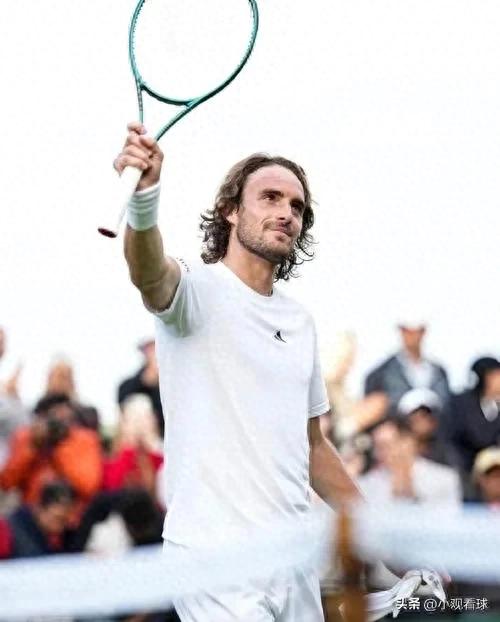Tsitsipas dilemma: the aura of the post-95 giants is gradually receding, and the confusion and struggle under the impact of the post-00s generation
In the fiercely competitive landscape of men's tennis, the course of the 2025 season has quietly revealed the delicate and difficult situation in which Greek star Tsitsipas finds himself. His record so far is 16-9, a result that is clearly unsatisfactory for a player who once stood in the top 10 in the world and had high expectations. What is even more interesting and thought-provoking is that the 9 defeats he swallowed, the opponents are all post-00 players, this phenomenon is like a wake-up call, clearly sounding his survival crisis under the wave of the new era.

Looking back at Tsitsipas's career, he rose to fame at a young age and was hailed as a promising star in men's tennis. In 2019, Tsitsipas made his debut at the ATP Finals, beginning a legendary journey. In the semi-finals, he faced the legendary Federer, and with his tenacious fighting spirit and excellent tactical execution, he defeated his opponent with a score of 6-3, 6-4 and successfully reached the final. In the final, he faced Thiem in a hard-fought three-set showdown to lift the trophy 6-7 (6), 6-2, 7-6 (4). The victory not only made him the youngest year-end Finals champion since Novak Djokovic in 2006, but also showed the world his talent and fighting spirit.

However, as time went by, with the rapid rise of post-00s players in the tennis world, Tsitsipas's path forward became thorny. In the first round of the 2025 Australian Open, he lost to 20-year-old American rookie Mickelson, ranked 42nd in the world, 5-7, 3-6, 6-2, 4-6, and ended his Grand Slam journey early. This is just the beginning, in the subsequent events, he lost to a number of post-00 players one after another, and returned home again and again in the game, and his former self-confidence and domineering seemed to have been worn out unconsciously.
After the Australian Open, Tsitsipas lost in the quarter-finals in Rotterdam to Italy's Bruchi, who was born in 2001.
In the first round of the Doha tournament, he lost to Serbia's Mejdovic, who was born in 2003.
In the fourth round of Indian Wells, he lost to Denmark's Rune, who was born in 2003.
In the third round in Miami, he lost to the American player Korda, who was born in 2000.
In the 1/4 finals of Monte Carlo, he lost to the Italian player Musetti, who was born in 2002.
In the third round in Madrid, again lost to Musetti.
The other two defeats came at the beginning of the year in the Union Cup to 2000-born Shepchenko, who retired midway through the quarter-finals at Barcelona, sending Fils to qualify.
From a technical point of view, although Tsitsipas's style of play is comprehensive, it gradually exposes some problems when facing the more aggressive and aggressive style of play of post-00 players. Although his forehand is powerful, he lacks consistency and often makes mistakes in key points, which is especially fatal in the multi-shot confrontation with post-00 players. For example, in the match against Musetti, when facing a crucial break crisis at 3-3 in the deciding set, Tsitsipas made frequent errors on his forehand and even made double service errors to send a break gift, which ultimately led to him losing the match. And his backhand, although it was considered a relatively stable scoring method in the past, is difficult to play at its due level in the face of the strong pressing attack of post-00 players, and often falls into a passive defensive situation.
In terms of tactical layout, Tsitsipas also failed to adapt to the rhythm of the post-00 players in time. Today's post-00s players have a changeable style of play and flexible tactics, and they dare to take risks on the field, take the initiative, and put huge pressure on the opponent. In the face of these changes, Tsitsipas did not adjust his tactics in a timely manner and was often led by the nose by his opponents. In many encounters with Rune, Rune has always been able to disrupt Tsitsipas's rhythm through flexible tactics, making him look a little overwhelmed on the field, which has also made Tsitsipas always have the upper hand in the duel between the two, and has not been able to achieve his first victory against Rune so far.
The psychological level is also a hurdle that Tsitsipas needs to break through. Losing to post-00 players in a row undoubtedly brought a heavy blow to his psychology and frustrated his self-confidence. In the game, we can clearly see his hesitation and lack of confidence in key moments, and this change in mentality directly affects his technical performance. He seemed to be under too much pressure to give it the chance he did when he was younger, and he missed a lot of opportunities in the game.
In the second round of the Rome Masters, Tsitsipas defeated Muller 6-2, 7-6(3) to advance. In the third round, he will face France's Phils, who was born in 2004. Can Tsitsipas break the 2025 winless streak of 00 players?

Looking ahead, Tsitsipas will have to make a change if he is to break through this dilemma and return to the top. He will need to develop his technique to improve the stability of his forehand and the aggression of his backhand, as well as strengthen his physical reserves to adapt to the increasing intensity of the game. In terms of tactics, he needs to study his opponents more deeply, develop more flexible tactics, and learn to take the initiative to control the tempo of the game, rather than being led by the opponent. More importantly, he must adjust his mentality, regain his former confidence and domineering, let go of his baggage, and face the game with a more relaxed attitude.
Gone are the days of the past, and now Tsitsipas is at a crossroads in his career. The impact of the post-00 players is a challenge, but also an opportunity, only by bravely facing the predicament and actively making changes, he can find his own position in this highly competitive tennis court and write a new chapter of his own.
[Come and see me] [Rose] [Flicking fists]







 Links
Links
 Contact
Contact
 App
App


